Some time ago, I was at a highly sophisticated biryani tasting session. About halfway through about a dozen different offerings, I ate a spoonful of rice, and was instantly engulfed by huge waves of nostalgia. Powerful taste memories came flooding into my mind, and I was back at my grandmother’s table, eating small dabs of a dark, intensely flavoured sauce off my plate. What I had just eaten was an Andhra ulava charu biryani made with slow cooked horse gram. The dish I remembered from my childhood was mudre kanni, a beautiful rich red sauce, made from the heavily reduced extract of horse gram. Unlike the ulava charu of Andhra, which is a mainstay of the cuisine and eaten regularly, Coorg’s much loved mudre kanni is a special dish that reached our tables directly via the farmyard.
Horse gram, (Macrotyloma uniflorum) known as cheriye mudre in Coorg, and as kulthi, hurali and by various other names elsewhere, was always cooked in gargantuan quantities, particularly during the season when the fields were being thoroughly ploughed to prepare them to receive the young rice saplings. On the coffee estate neighbouring my husband’s ancestral property, enormous vessels would bubble on wood fires as horse gram was cooked to feed the bullocks that drew the ploughs. The gram was cattle fodder, but the liquid that was drained from the cooked gram was precious stuff. Neighbours would be invited to come and collect as much of the extract as they wished. Soon, people from all the surrounding homes would trail in with empty milk cans, aluminum pails and chembus, (lotas), to carry away the protein and iron rich extract, to be boiled down and seasoned into a thick, earthy sauce.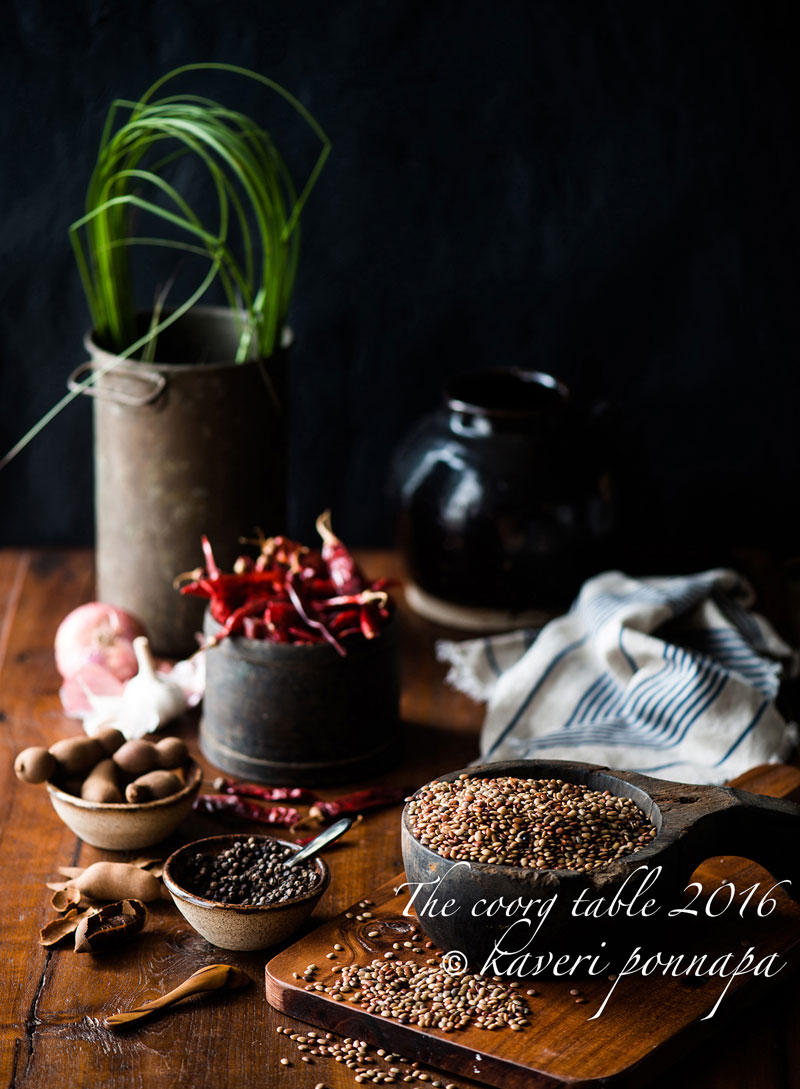
Mudre kanni is best eaten with steaming hot rice. If you have a rich red colour, and a sauce with a deep, intense flavour, salt, sweet and spice lightly mingled into a taste that lingers on and on, and makes you reach out your fingers for one last lick time and again, then you have made the perfect mudre kanni. It needs to be savoured in smallish quantities, without too many other accompaniments to crowd its flavours – preferably none at all. It belongs to the category of ‘heating’ foods, so we were always cautioned to consume it with care. That’s also probably the reason it always showed up on the table in cold, wet weather, in a large ceramic jug, its glaze crackled with use and age.
It is one of those unusual foods that linked us directly with our farmyard animals – decades ago, the cooking of this sauce always involved community, for just this reason. One of our venerable Coorg elders, a repository of fantastic and engaging stories of other times told me how, in 1946, timber merchants, with two large elephants, arrived at his village. The felling of trees was a very rare event then, unlike today’s unbridled slaughter – everyone gathered to watch what was going on. The men and elephants camped by the riverside, where every evening, the elephants were bathed and fed and children were allowed to play with them.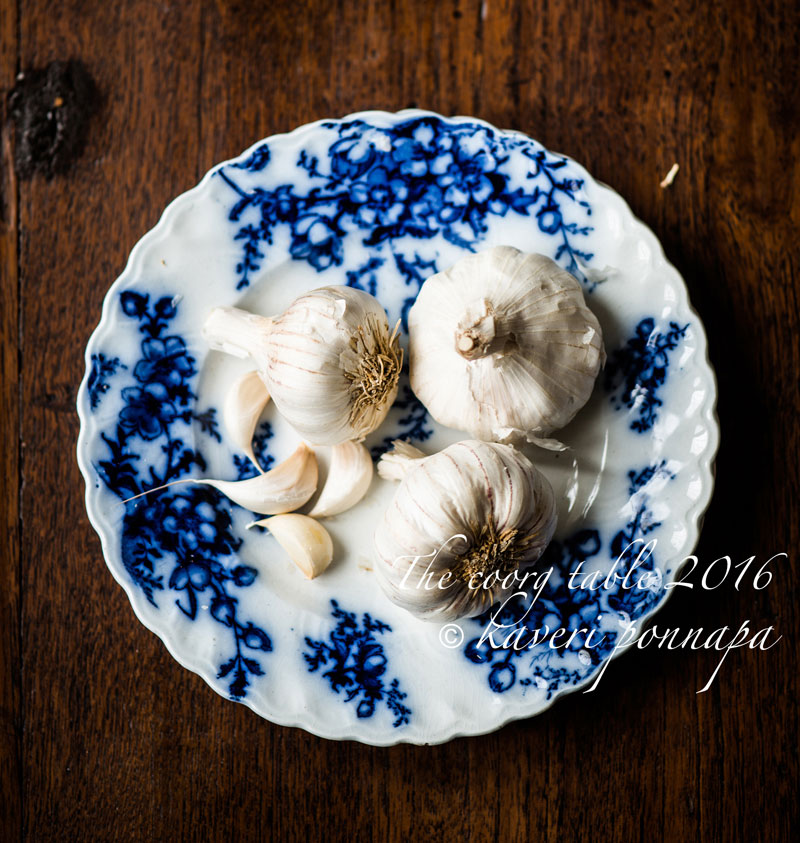
A gigantic cauldron of cheriye mudre bubbled on a wood fire, the fragrance steaming into the air, and the extract was filled into empty kerosene tins. Children from every house came with chembus (lotas) to collect a share. The mahouts were scrupulously fair about equal shares for everyone, and each family reciprocated by taking turns to feed them simple meals every day.
Mudre kanni was always cooked on a wood fire and considered a rare treat, eaten with par-boiled rice. His mother, declared Ajja, while telling his story, made the best mudre kanni ever, the likes of which he has never tasted again. It was also, he said, one of those dishes that you always shared with those who could not make their own, making sure that no one in the village went without.
From all the wonderful accounts I have listened to, mudre kanni, it appears, was always part of a series of exchanges – when traders came up from the plains to the remote villages of Coorg, five to six loaded bullock carts working their way up to the hills, they camped for days, unloading potatoes, jaggery and coriander seeds. They took back Coorg’s famous fragrant rice, jackfruit and all kinds of forest produce. Every evening, at their camp, cheriye mudre was boiled to feed the bullocks and the women of the village would be quick to reserve a share in advance. Ajja’s mother was always quick with her bookings, so, as long as the traders stayed, there was always mudre kanni in their home – a great luxury, he recalls, as meat was hard to come by, and this was as rich in taste.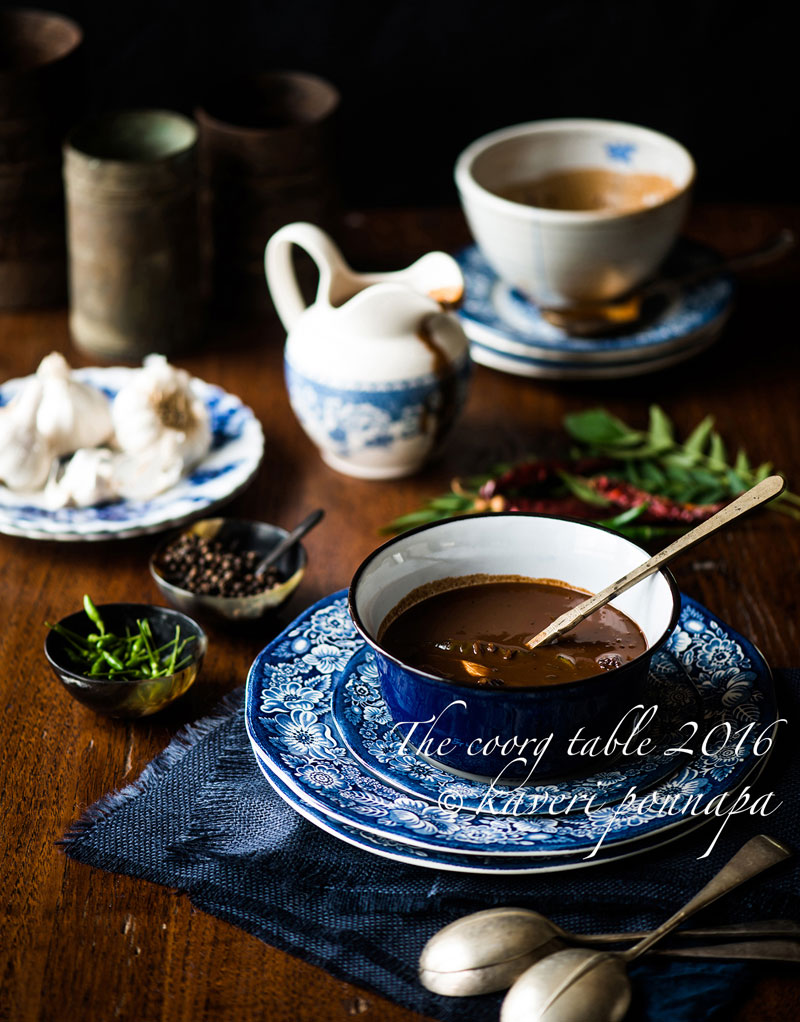
When I was growing up, this sauce was always part of a much more elaborate spread at mealtimes. But it still had a certain aura about it, of being something to be served out in small quantities, eaten sparingly, lingering over every drop: a special dish that refused to let us forget its frugal past. I don’t cook mudre kanni over a wood fire, unfortunately I don’t have one yet, and pressure-cooking helps reduce much of the work of boiling the beans. It still takes a fair bit of slow cooking to get that special flavour that is worth every bit of the effort. I love it with just plain rice, and it’s a bonus that it keeps for very well for long periods without spoiling. It’s also a dish that makes me think deeply about how we once cooked and ate, and how food came to our tables; and also about scarcity and plenty, and what we do to create both – I love mudre kanni even more for that.
Photo Credits: Nithin Sagi
All Food Styling: Kaveri Ponnapa
Please look out for this recipe in my upcoming cookbook.
Thank you for visiting this page. If you read something that you enjoy, or see an image that you like, please take a moment to write a response. Do look out for the recipes of all the food featured here in my upcoming cookbook.

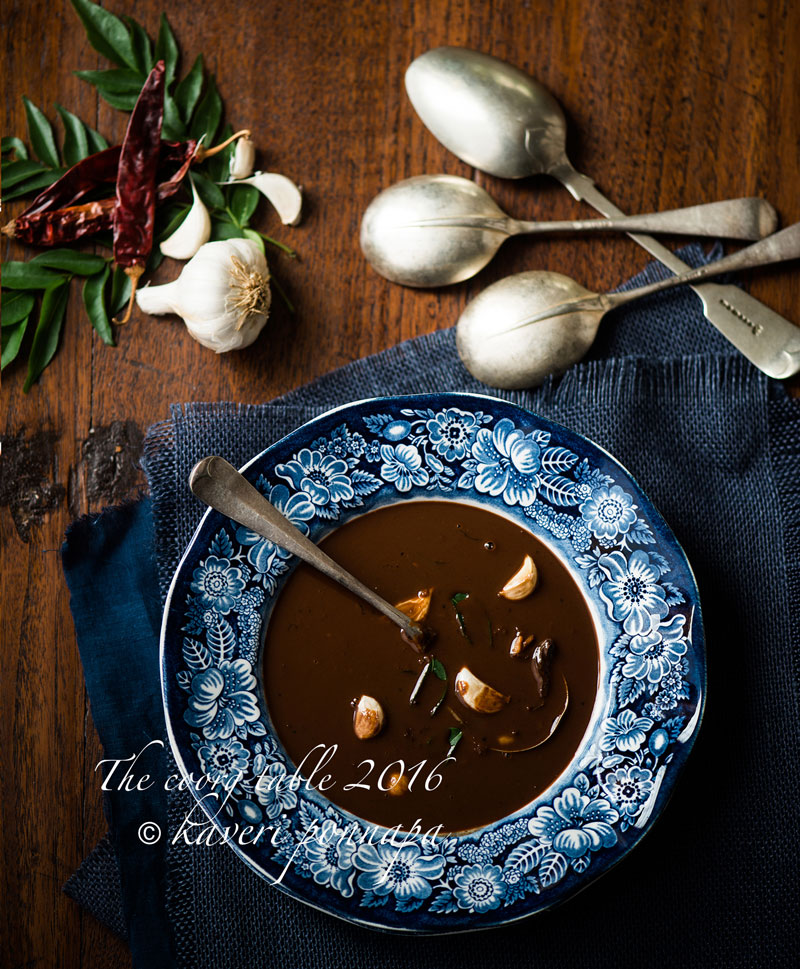
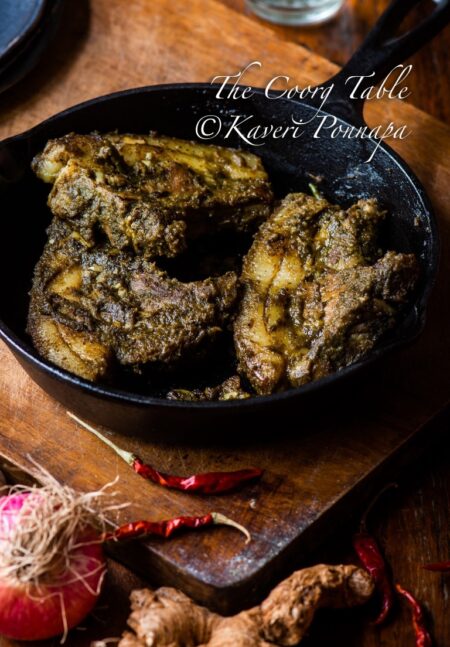
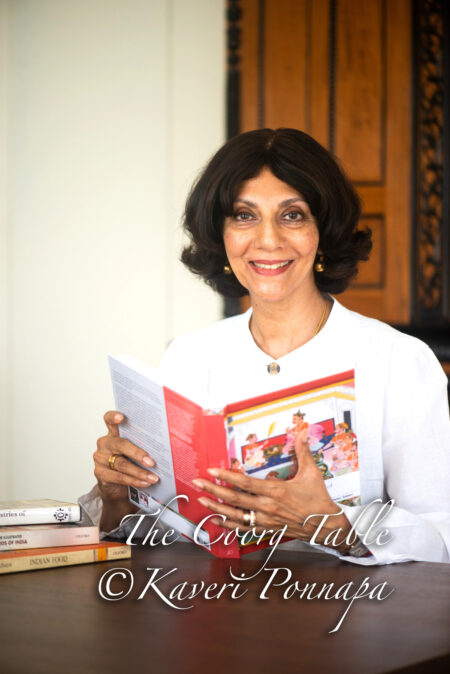
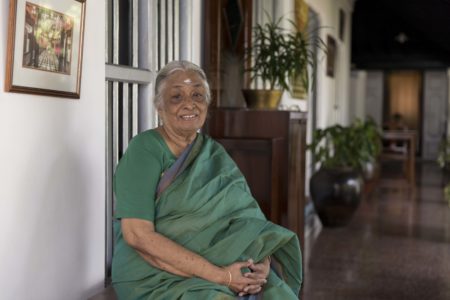
Wow in my childhood I used to eat this yummy ulavacharu with rice it is so delicious. After that, I tried ulavacharu biryani at Bawarchi Indian cuisine restaurant they remember me my childhood. After ages again now when I saw this blog. It remembers again thank you so much for your information. I suggest you to try once at Bawarchi it is the best Indian restaurant in Chelmsford.
Hi Padmaja, thank you very much for writing. It’s wonderful to hear that this post brought back memories of eating this dish. It really is quite delicious! Best wishes.Kaveri
In Kerala a dish called Muthira (kulith)) puzhukku is maade with Sonoran(elephant yam)& raw rajali kela .Kulith is soaked overnight.soaked Kulith is cooked with Sonoran &rawbanana,turmeric &salt .once done add ground paste of fresh grated coconut along with jeera &whole red chillies.Add coconut oil &currey leaves.This is to relished with fried pappads,raw mango PC’s &a dish called Benni(buttermilk prep)along with Kanji sprinkled with ghee. with ghee.
This is the first post on your blog I have read. I am smitten! This made my day. I have similar experiences with food and smells and my grandmother. I wish I knew more about this history of the dishes though (in Goa). Thank you for this
Welcome to The Coorg Table, Neil! If this post has made you think of forgotten foods, or summoned up memories for you, then it has done what I had hoped. Please keep reading, and share your thoughts here every now and then.
Dear Mrs Ponnapa,
Everytime I stop by at your table I seem to connect a little more to the land my parents speak so fondly of. I am a city girl who still vacations in Coorg once in a few years and your stories fill me with a longing to teleport back in time to see the ways of this beautiful unspoilt land in the days of the past.
Thanks to your post, I made a quick phonecall to my mother placing an urgent request for mudre-kanni and knowing I’ll be in India on Sunday she replies “Neek entha ella gena bappa kyunyi. Ikkale podurok edvi, Sunday katthane molke katva”.
Thank you so very much. Your post has made my day.
Hello Sowmya, what a lovely share! I can hardly wait for you to get home and enjoy your mudre kanni. I can imagine your mum’s joy in preparing it for you, and then waiting for you to arrive. I am so happy to be a small link in this beautiful episode-food is so much a part of who we are, with all the memories of place and much-loved people tied up with familiar tastes. I hope that you have a wonderful holiday in Coorg.Thank you for your kind words and for taking the time to write in-do keep reading these pages. Warm wishes. Kaveri
I do like mudre kanni with plain rice, even I have heard that Horse Gram is good for health too…As usual wonderful writing with lovely images…Eagerly waiting for your cook book & to see your next post. Thanks so much for bringing all these recipes back!!
Hello Kaverappa, I hope you got a good share of mudre kanni, it’s something that many of us enjoy very much -yes, it is full of a lot of rich nutrients, which is a bonus. Thank you very much for your appreciation, keep reading these pages and writing in, it’s a great encouragement. Warm wishes.Kaveri
Ms Kaveri,
I have a small request for this recipe. I live in Australia and my parents migrated here 25 yrs ago, they’re from Coorg and they talk every day of missing home. It’s currently 4 degrees and I was racking my mind for an idea to cheer them up when I saw this post. Would you please send me the recipe? I am more than happy to pay and pre order your cookbook as I know it’s something that will be a prized addition to our collection, but my aim to bring a little bit of home to my parents in this cold is something I hope to as soon as I can.
Kindest Regards
Hello Thanvi, I’m so glad that you found my blog, and I hope that you will read the other posts too. I can well imagine how much your parents miss Coorg and its tastes and smells and sights. I would be very happy to send you the recipe and you can expect it sometime over the next few days. Do keep reading these pages, and I hope your parents will too. Warm wishes.Kaveri
Dear Aunty,
Your recipe filled our home with the type of nostalgic joy that I couldn’t even begin to put in words – Thank You. I made the mudre kanni yesterday after soaking it the night before, I didn’t tell my parents and simply served it to them at dinner. They stared at me and tried to fathom how I was able to find this recipe, and as they ate, stories of Coorg flowed across the table. I learnt of mushrooms picked in the rainy season, of green leaves that are healthier then spinach, of crabs caught in the rice paddies and as they talked and laughed – I saw how this kanni was so much more than a beautiful curry but a connection to some of their happiest memories.
I’ve never had mudre kanni before but according to Amma and Pappa, the flavours were as they should be. It’s a very earthy curry, a little sweet and tangy with a really full body of flavour, it was the perfect dish with your recommendation of hot plain rice on a cold winter day.
Thank You for the recipe, thank you for your kindness and thank you for bringing a piece of Coorg to a cold winter’s day in Sydney.
with Kindest Regards,
The Kuppanda Family in Sydney, Australia
What a beautiful description of a moment and memories shared with you parents, Thanvi. And how very sweet of you to have surprised them like this. I am more happy than I can say to have been a small part of this lovely story. Food holds so many of the most vivid and precious memories of our lives, and in many ways, that is how The Coorg Table began. I hope you will cook from the recipes that are still on the site, and I am going to try and finish the book as soon as possible, to be able to share more. Warm wishes.Kaveri
This post took me back to the days when my grandma would simmer a large earthen pot of horse gram broth on wood fire for hours. A day every few months was reserved to just making ulava charu at home. I cannot imagine a childhood without this earthy sauce and it remains my favorite dish to date. A bowl of steaming hot rice with a tablespoon of ulava charu and generous amounts of ghee still defines home in a bowl to me. Thank you so much for this post. It took me down memory lane and I cannot wait to taste your version of mudre kanni. Look forward to your book!
Thank you very much, Archana, for having shared your memories, it’s always wonderful to see how the same dish means so much to people in ways that are familiar, and yet different,because of the personal experiences we bring to it. And now to plan for a time when we can share this together! Do keep reading and posting.Warm wishes.Kaveri